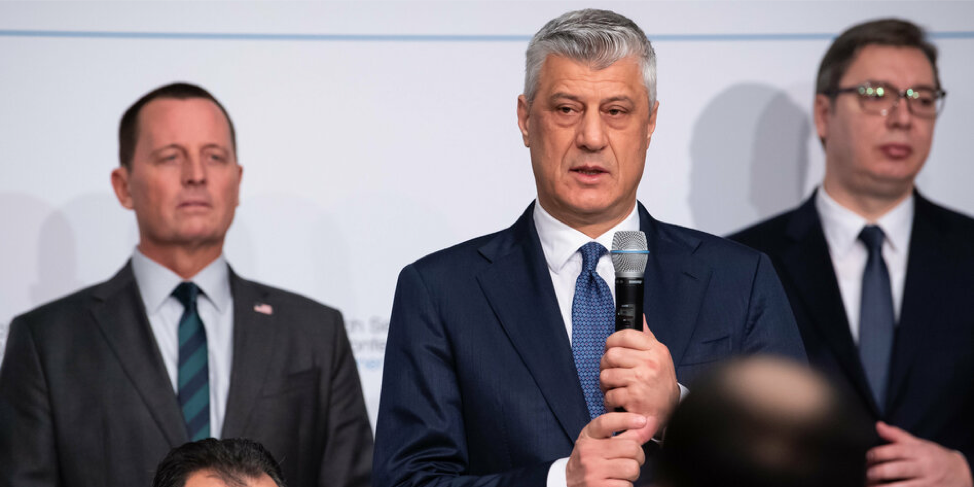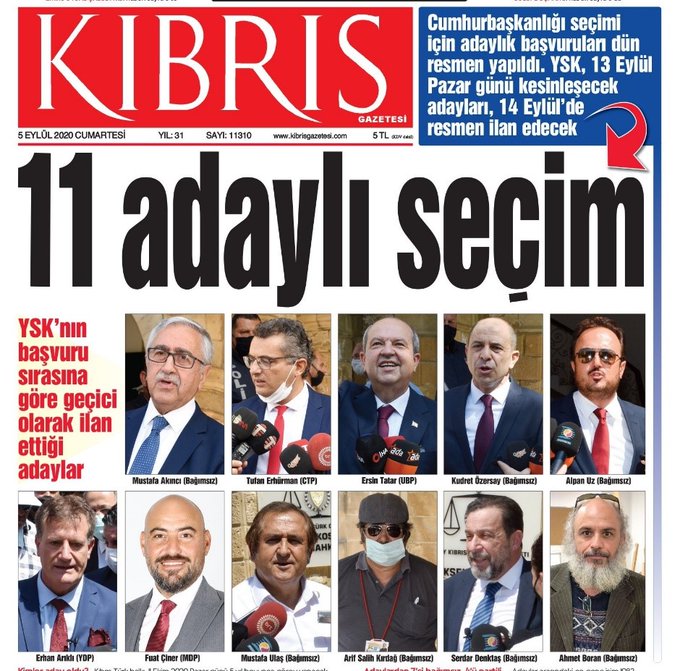Political Rift in Kosovo: The “Final” Agreement that Trump “Needs” Between Kosovo and Serbia
On the 25th of March, the newly established government in Kosovo, led by the Self-Determination Movement (VV), fell in response to a no-confidence motion presented in the Parliament by the Kosovo Democratic League (LDK). This party was part of the coalition government that fell. While it may seem so at first sight, it is not entirely odd for a party which is part of a coalition Government to instigate the fall of that government. However, what was odd about LDK’s motion of no-confidence is its timing and justification – fundamentally bound to American demands for a possible “final” agreement between Kosovo and Serbia.
LDK, as a key coalition partner, presented their no-confidence motion at an unusual time. First, it came in less than two months after the government had been formed. Second, it came at a time when the new government was mobilizing state-wide forces to prevent the spreading of COVID-19 inside the country.
While many politicians went viral on traditional and social media to advice citizens to respect social distancing and to stay home, LDK was going to have none of that. They urgently called the Parliament to commence with the session, which was going to put their government down. With masks on their faces, gloves on their hands, Parliament civil servants spraying and sweeping MP’s microphones after every speech, and with special seating arrangement put in place for social distancing within the Parliament chamber, more than two-thirds of MPs voted the Government out.
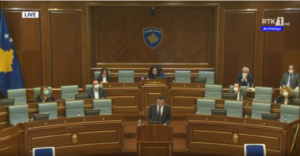
Image: Kosovo Parliament during no-confidence motion presented against the Government (source: Kosovo Public Broadcaster – RTK)
Trade Tariffs and the Principle of Reciprocity
At the crux of the fall of the government in Kosovo lies with the U.S.’s demand for Kosovo to lift the 100 percent trade tariff that the previous government had put against Serbia’s imports. Kosovo slapped Serbian imports with a 100 percent tariff in November 2018, in response to what the previous Government argued, Serbia’s diplomatic efforts to block Kosovo’s membership in international organizations and its successful efforts in convincing a few states to withdraw their recognition of Kosovo. Indeed, the trade tariff was put immediately after Kosovo’s third failed attempt to join Interpol in 2018.
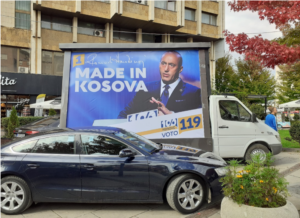
Image: Former Kosovo PM, Ramush Haradinaj, featuring with his electoral campaign motto a “100% state” (source: Eiki Berg)
Both VV and LDK created the new Government with a coalition agreement, which suggested that they will lift the 100 percent tariff by replacing it with reciprocal measures against Serbia. Reciprocity was going to be followed as an international principle, whereby whatever Serbia does against Kosovo’s goods, services, citizens, Kosovo would reciprocate by doing the same. This includes such non-tariff barriers that Serbia put on Kosovo, including the inability of the latter’s citizens to enter Serbia with their vehicle license and passports, or the inadmissibility of Kosovo issued documents when interacting with Serbia’s institutions, and so on.
Soon after the coalition was formed and the Government became operational, LDK was increasingly uneasy with the planned policy of replacing tariffs with reciprocity – something which they had agreed as part of the coalition agreement. Not that LDK did not want to remove the tariff. In fact, they wanted to remove it without implementing the reciprocity measures. This is mostly because of the U.S. officials’ public statements that Kosovo must lift the 100 percent trade tariff immediately and unconditionally.
Making the U.S. slightly unhappy is uncommon in Kosovo. For those that follow domestic politics in Kosovo, occasional press releases that the U.S. Embassy in Prishtina issues every now and then, almost immediately become Government policy in the country. VV, as the winning party in the recent elections and the main coalition partner, was set to lift the 100 percent tariff against Serbia, but not unconditionally as the U.S. had been demanding. They were set to replace the tariff with reciprocity measures – the implementation of which would make the lifting of the tariff slightly more delayed than what the U.S. had been demanding.
A Coup and an Agreement that Trump Seems to Want Before U.S. 2020 Elections
It appears that VV’s stance was politically too unorthodox for LDK to handle. Not implementing the U.S.’s demands immediately and unconditionally was too much to swallow for LDK. As a result, and in stating through a public letter the possible “danger” of “harming” Kosovo’s relations with the U.S., LDK went to vote its own government out of power.
What remained clear but not explicitly stated in LDK’s public letter where they justified their reason to vote the government out was that they were doing this in response to U.S.’s demands. Now, one may suggest that this is nothing less than a democratic process whereby a Government falls due to a non-confidence vote. But unable to escape reading into the fine lines of LDK’s decision, I cannot go without stating that this was nothing less than a coup instigated by the U.S. using LDK as an instrument to make the coup transparent, but also, and importantly, peaceful.
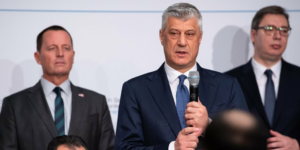
Image: Donald Trump’s Envoy for Kosovo and Serbia, Richard Grenell (left), Kosovo’s President, Hashim Thaci (center), Serbia’s President, Aleksandar Vucic (right). (Source: FAZ)
But why the urgency among select U.S. political circles?
Kosovo’s 100 percent trade tariffs on Serbia’s imports have been a major hurdle for the negotiations between the two parties to continue. Kosovo and Serbia have been part of the Brussels facilitated negotiations on the “normalization of relations” since March 2011. As soon as Kosovo began applying the tariffs, Serbia withdrew from the negotiation process until Kosovo removes the tariff.
As such, the tariff was also a major blow to Kosovo’s President, Hashim Thaci, and Serbia’s President, Aleksandar Vucic, idea of a possible “land for peace” deal between the two parties. The idea has been circulated in the media by both Presidents since summer 2018 – none of them making it clear what they were suggesting with such phrases put to the public test as “land swap,” “border correction,” “border demarcation,” and so on. But many in Kosovo, and elsewhere, worried that such ideas entitled a “final” agreement whereby Kosovo cedes parts of its Serb-majority northern territory to Serbia in exchange for gaining recognition from the latter.
The international community was divided on the issue, including many among policymaking circles in the U.S. – but not all. It appears that those close to Trump, such as his former national security advisor, John Bolton, who hailed the idea as something which should be pursued.
It also appears that Trump would want a “Rose Garden” event before the U.S. November 2020 elections take place – whereby he would be at the center of some major international event such as the signing of some peace agreement between parties of a long-standing conflict. Those closer to Trump seem to want to prompt a “peace” agreement of some sorts from somewhere.
The recent Trump administration proposal for an agreement between Palestine and Israel does not seem to work for another “Rose Garden” event between the Palestinians and Israelis in Washington, D.C. It appears that the push has tilted towards the Balkans where such an agreement, as superficial as it may be, so long as it is presented as a major “peace” agreement that Trump will have achieved, would be presented before the U.S. elections.
Whether these circles within Trump’s administration will be successful in pulling a “final” agreement where land and borders might be at the heart of the agreement between Kosovo and Serbia still remains unknown. But, my view of the recent Kosovo’s Government fall is that it might certainly have to do with Trump’s urgency to cut any deal, including the change of borders between Kosovo and Serbia – so long as it would present Trump as a “man of peace” before the November elections. The jury remains out.
Author: Shpend Kursani


